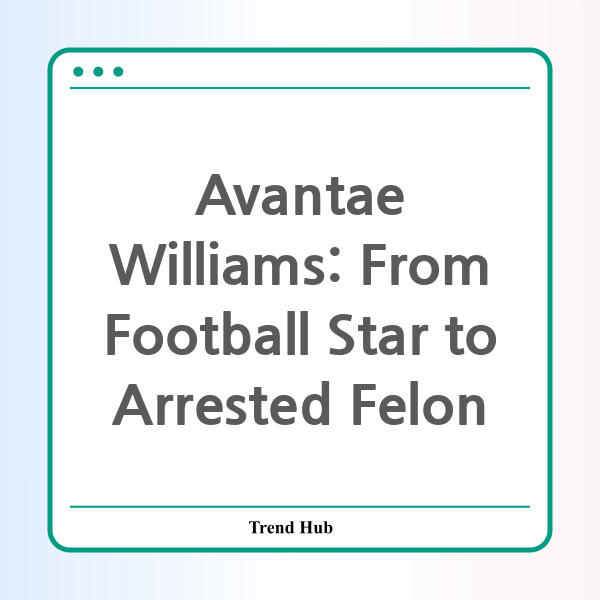* This website participates in the Amazon Affiliate Program and earns from qualifying purchases.

How Did Avantae Williams Go From Football Star to Facing Murder Charges?
This past weekend, the sports world was shaken by the unfortunate news of Avantae Williams, a former safety for the Miami Hurricanes and the Maryland Terrapins, being arrested and charged with second-degree murder. Williams, 24, is accused of being involved in a shooting that led to the death of Keshod Harris in DeLand, Florida, a tragic turn of events that has left many questioning how a promising athlete could find himself in such dire circumstances.
Williams's journey in college football began with great promise; he was heralded as the No. 1 safety in the 2020 class and quickly made headlines as a highly touted recruit. However, his career was marred by off-field issues, including a previous arrest in 2021 for aggravated battery, which resulted in his dismissal from the Miami football team. Despite the challenges, Williams transferred to Maryland and played in four games before this incident unfolded, raising crucial questions about the pressures athletes face both on and off the field.
The incident that led to Williams's arrest occurred at McCabe's Bar in DeLand on Saturday morning. Witness statements and surveillance footage revealed that the confrontation escalated from a previous argument over jealousy, involving Harris's girlfriend, Decassia Bing. This powder keg situation culminated in violence when Harris arrived at the bar and confronted Williams and his associates.
According to police reports, after a series of altercations, Williams produced a firearm and shot Harris, who was only 32 years old and tragically succumbed to his injuries after being shot multiple times. The chaotic scene not only resulted in a loss of life but also left a bartender injured, highlighting the far-reaching consequences of such violent acts.
In a striking display of naivety, Williams reportedly attempted to flee the scene in a panic after firing the shots. Evidence collected by the police, including an iPhone left behind and surveillance video, pinpointed Williams's involvement, leading him to ultimately turn himself in at the office of his attorney. He has been described as cooperative during his arrest but remains in custody without bond as the case unfolds.
The ramifications of this case extend beyond the immediate tragedy of Harris's death. It raises serious questions regarding mental health support and the emotional well-being of athletes, particularly those faced with pressure on and off the field. Are institutions doing enough to provide support systems for young athletes prone to making rash decisions? The stark transition from being a revered football player to facing serious criminal charges serves as a cautionary tale for many.
As the investigation continues, the implications of this incident will likely resonate throughout the sports community and beyond. For many young athletes, the stakes have never been higher—each decision can lead to life-altering consequences. The tragic fate of Keshod Harris is a reminder of the fragility of life and the impact of our choices.
As Williams's case progresses, one can only hope that it sparks a broader conversation about accountability, mental health, and the pressure young athletes face, ultimately leading to systemic changes that could prevent such tragedies in the future.
* This website participates in the Amazon Affiliate Program and earns from qualifying purchases.